The 2018 Farm Bill authorized USDA to establish a demonstration project for one or more tribal organizations administering the Food Distribution Program on Indian Reservations (FDPIR) to enter into self-determination contracts as defined in section 4 of the Indian Self-Determination and Education Assistance Act, to purchase USDA Foods for the FDPIR food package for their tribe.
Under normal program operations, all USDA Foods provided in the FDPIR food package are purchased and provided by USDA. Through this demonstration project, participating tribes are able to:
- select one or more foods that they would like to procure for inclusion in the food package,
- identify the food(s) in the food package that they would like to supplant with the tribally procured food(s),
- establish contract(s) with a vendor(s) to procure the selected food(s), and
- distribute the tribally procured food(s) alongside other USDA-provided foods in the FDPIR food packages distributed to their tribal members.
There are a few requirements associated with the tribally procured foods, including that they are domestically sourced and that they are of similar or higher nutritional value as the food(s) being replaced.
The demonstration project:
- supports tribal self-governance by allowing participating tribes to purchase similar foods of their choosing, supporting tribal dietary preferences;
- allows tribes to purchase foods through commercial vendors of their choice;
- supports tribal economies as tribes may choose to contract with local, regional, and/or tribal vendors; and
- provides FNS with an opportunity to see how tribal procurement may work under a food distribution program model across region, program size, and food selection.
The map below highlights tribes currently participating in the demonstration project:

Round 2 Projects
USDA awarded $4.4 million dollars to tribal nations participating in round 2 of the demonstration project. Project implementation began in August 2023 with some contracts expected to last up to three years, through 2026. More information on each tribe's project is outlined below.
- Cherokee Nation
Tribally Procured Foods beef chuck roast, ground beef chubs USDA Supplanted Foods beef chuck roast, ground beef chubs Vendors 1839 Cherokee Meat Company (Native vendor) Distribution Months 36 months 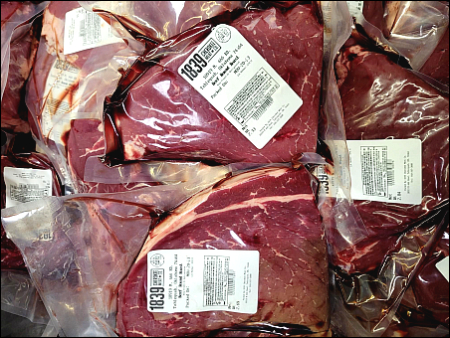

- Confederated Tribes of the Umatilla Indian Reservation
Tribally Procured Foods ground beef, beef chuck roast, celery, lettuce, cabbage, carrot, squash, cucumber, honey dew melon, peaches, oranges, apples, cherries, apricots, eggs USDA Supplanted Foods ground beef, beef chuck roast, celery, lettuce, cabbage, carrot, squash, cucumber, cantaloupe, peaches, Crenshaw melon, apples, cherries, apricots, eggs Vendors Hines Meat Company, JC's Custom Meats, Yakama Nation Farms (Native vendor), Rez Chicks Fresh Eggs Cooperative (Native vendor) Distribution Months 36 months - Gila River Indian Community
Tribally Procured Foods tepary beans USDA Supplanted Foods dry beans Vendors Ramona Farms (Native vendor) Distribution Months 14 months 
- Quinault Indian Nation
Tribally Procured Foods canned albacore tuna, canned Coho salmon, canned King salmon, King salmon fillet, razor clams, ling cod, rock fish USDA Supplanted Foods chunk light tuna, canned chicken, canned beef, frozen salmon, bison, walleye, whole frozen chicken, catfish Vendors Quinault Pride Seafood (Native vendor) Distribution Months 36 months - Sokaogon Chippewa Community
Tribally Procured Foods wild rice, carrots, cauliflower, pickling and slicing cucumbers, sweet corn, roma and slicing tomatoes, zucchini, bison burger, ground beef, pork chops, chicken breast USDA Supplanted Foods wild rice, carrots, cauliflower, cucumbers, sweet corn, tomatoes, zucchini, bison burger, ground beef, pork chops, chicken breast Vendors Forest County Potawatomi's Bodewewadmi Ktegan Farm (Native vendor), Carson Ackley, Wild Rice Harvester (Native vendor), James Polar, Sr., Wild Rice Harvester (Native vendor) Distribution Months 36 months - Spirit Lake Tribe
Tribally Procured Foods bison USDA Supplanted Foods bison Vendors North American Bison, LLC Distribution Months 36 months Beginning Oct. 2023, Spirit Lake Tribe will be offering a variety of tribally procured bison products to their participants as part of their FDPIR Self-Determination Demonstration Project. The products include: bison dogs, bison ribeye, bison sirloin steak tips, and bison burgers.
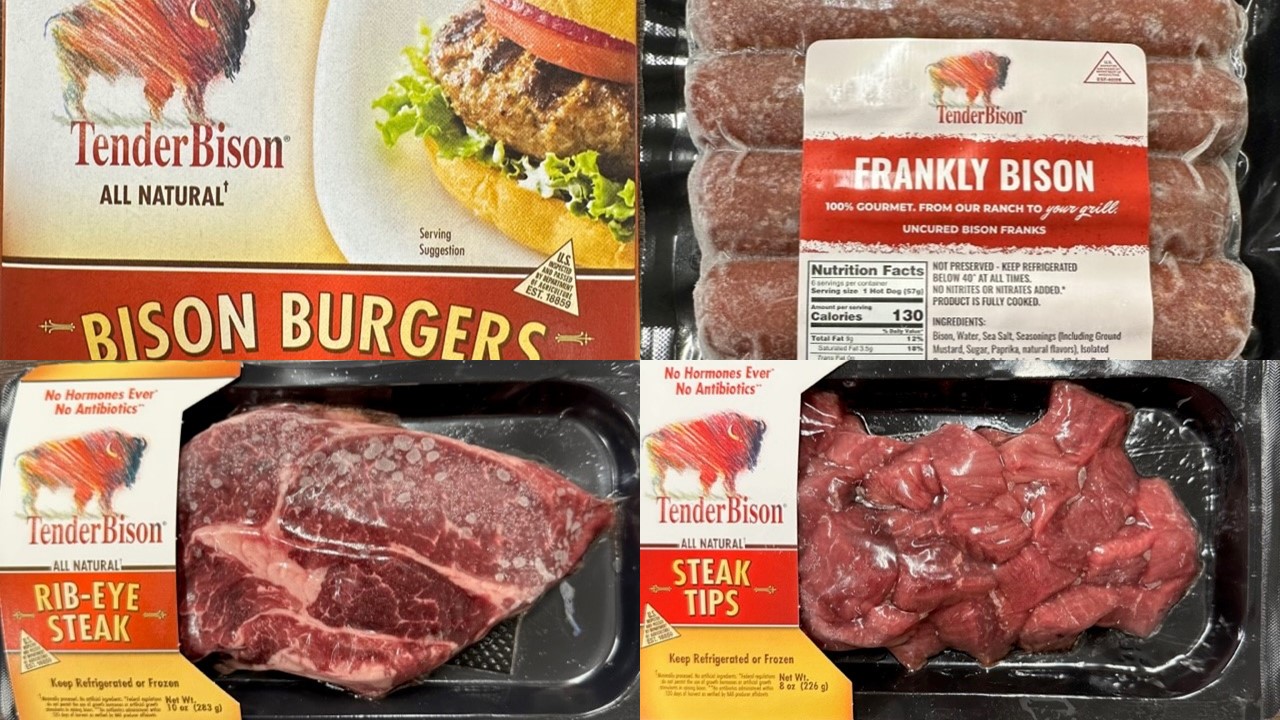
Photo credit: Spirit Lake Tribe - Tohono O'odham Nation
Tribally Procured Foods soft wheat berries (various), hard wheat berries, wheat flour (various), white tepary beans, brown tepary beans, garbanzo beans USDA Supplanted Foods dehydrated potatoes, cherry apple juice, corn flakes cereal, all-purpose flour, egg noodles, canned pinto beans, dry pinto beans, cream of chicken soup Vendors Ramona Farms (Native vendor), San Xavier Cooperative Farm (Native vendor) Distribution Months 36 months - White Mountain Apache Tribe
Tribally Procured Foods barbecue corn, corn, summer squash, patty pan squash, green chilies, blue corn meal, ground beef, tongue, intestines, steak, liver, sweet bread, walnuts, acorns, pine nuts USDA Supplanted Foods canned corn, fresh corn, squash, canned carrots, jalapenos, yellow corn meal, ground beef, bison, chicken, roast beef, canned chicken, canned beef, peanuts, peanut butter, and fruit and nut mix Vendors Ndee Bikiyaa Farm (Native vendor), SPO Land and Cattle Co. Distribution Months 36 months
Round 1 Projects
USDA has awarded just under $7.0 million dollars to tribal nations participating in round 1 of the demonstration project. Project implementation began in October 2021 with some contracts extended through 2026. More information on each tribe's project is outlined below.
- Oneida Nation and Menominee Indian Tribe of Wisconsin (joint project)
Tribally Procured Foods ground beef, bison, beef roast, apples, white fish/lake trout, wild rice, walleye USDA Supplanted Foods ground beef, bison, beef roast, apples, catfish/salmon, wild rice, walleye Vendors Oneida Nation Farm, Oneida Nation Apple Orchard, Red Cliff Fish Company, and Spirit Lake Native Farms Distribution Months 6 - 24 months A video showcasing the Oneida Nation - Menominee Indian Tribe of Wisconsin, self-determination demonstration project, and the many benefits the project is bringing to tribal members. Video production credit: The Self-Governance Communication & Education Tribal Consortium (SGCETC).

Wild rice from Spirit Lake Native Farms. The Oneida Nation and Menominee Indian Tribe of Wisconsin are partnering on a joint self-determination demonstration project that will provide tribally procured ground beef, bison, beef roast, white fish, lake trout, apples, and wild rice to their FDPIR participants.
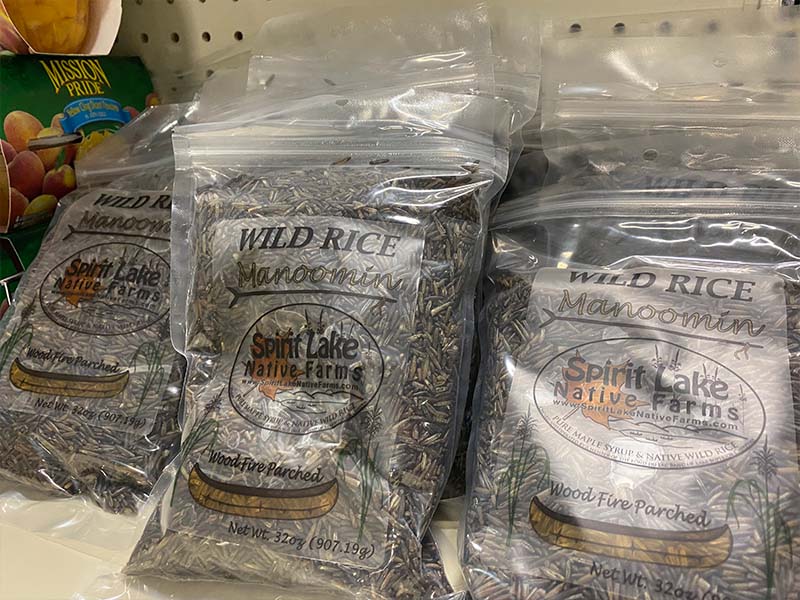
- Little Traverse Bay Bands of Odawa Indians (LTBB)
Tribally Procured Foods all fresh produce, walleye USDA Supplanted Foods all fresh produce, walleye Vendors Red Lake Nation Fishery Distribution Months 24 months Jake Robinson (right), General Manager of Red Lake Nation Fishery, delivers walleye fillets to Joe Van Alstine (left), FDPIR Program Director for the Little Traverse Bay Bands of Odawa Indians. Red Lake Nation Fishery is located in Redby, Minnesota, and is owned and operated by Red Lake Nation.

Photo credit: Jo Van Alstine. - Red Cliff Band of Lake Superior Chippewa
Tribally Procured Foods frozen white fish, carrots, potatoes of various colors, cucumbers, romaine/butterhead/green leaf lettuce, frozen squash, apples, fresh and frozen blueberries, wild rice, tomatoes, onions, summer squash, radishes, cherry tomatoes, winter squash, salad mix, smoked fish USDA Supplanted Foods salmon, carrots, red potatoes, cucumbers, romaine lettuce, canned vegetables, apples, frozen blueberries, wild rice, tomatoes, onions, summer squash, radishes, cherry tomatoes, winter squash, canned fish Vendors Dynamite Hill Farms, Highland Hill Farms, Red Cliff Fish Company, and Mino Bimaadiziiwin Tribal Farm Distribution Months 31 months Program Contact Vincent "Butch" Bresette
Butch.bresette@redcliff-nsn.gov
(715) 779-3740The Mino Bimaadiziiwin Farm, which is owned and operated by The Red Cliff Band of Lake Superior Chippewa, provides fresh produce to FDPIR participants through the demonstration project. Produce items provided by the farm for the project include everything from carrots and squash to lettuce and salad mix.
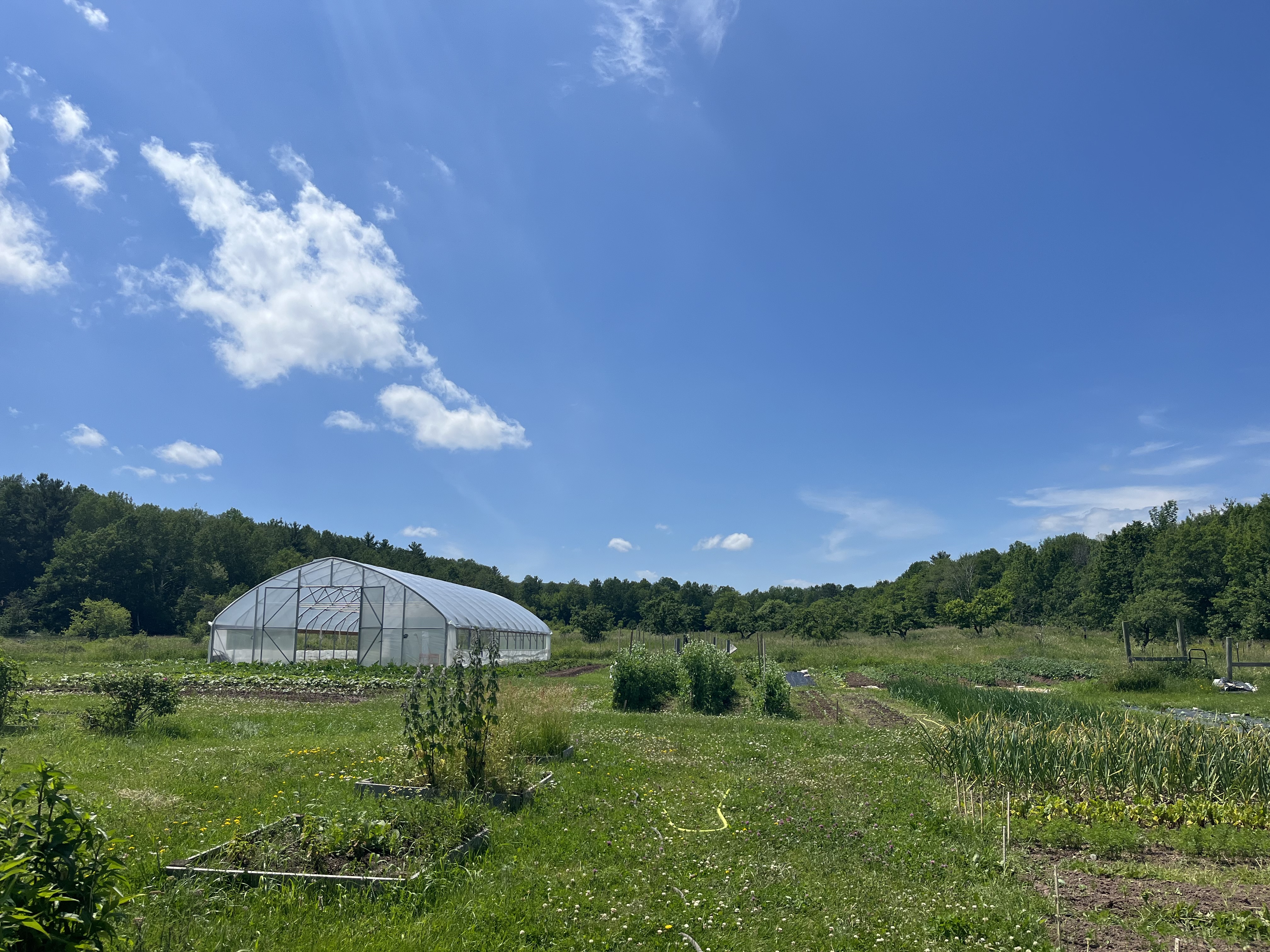
Photo credit: Mino Bimaadiziiwin Tribal Farm. The Red Cliff Fish Company is located within the Red Cliff Reservation, which spans 22 miles of Lake Superior shoreline in northern Wisconsin. Through the FDPIR self-determination demonstration project, Red Cliff Fish Company will provide fish products to FDPIR participants in The Red Cliff Band of Lake Superior Chippewa, the Oneida Nation, and the Menominee Indian Tribe of Wisconsin.
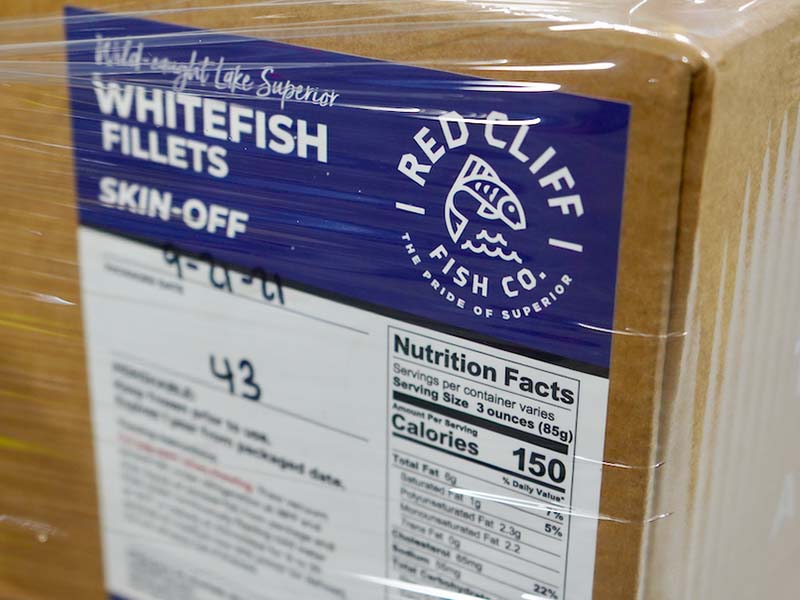
Photo credit: Daniel Cornelius. Check out the project photo gallery.
- Chickasaw Nation
Tribally Procured Foods ground beef, roast beef, dry hominy, stew meat, pecans USDA Supplanted Foods ground beef, roast beef, wild rice, canned beef, peanuts Vendors Rolland Ranch Beef, Guderian Foods, and Bryant Pecan Company Distribution Months 24 - 33 months Ground beef from Rolland Ranch Beef, LLC. The Chickasaw Nation is utilizing FDPIR self-determination contract funding to purchase both ground beef and roast beef from Rolland Ranch Beef, LLC., a tribally-owned and family-operated ranch in Checotah, Oklahoma.
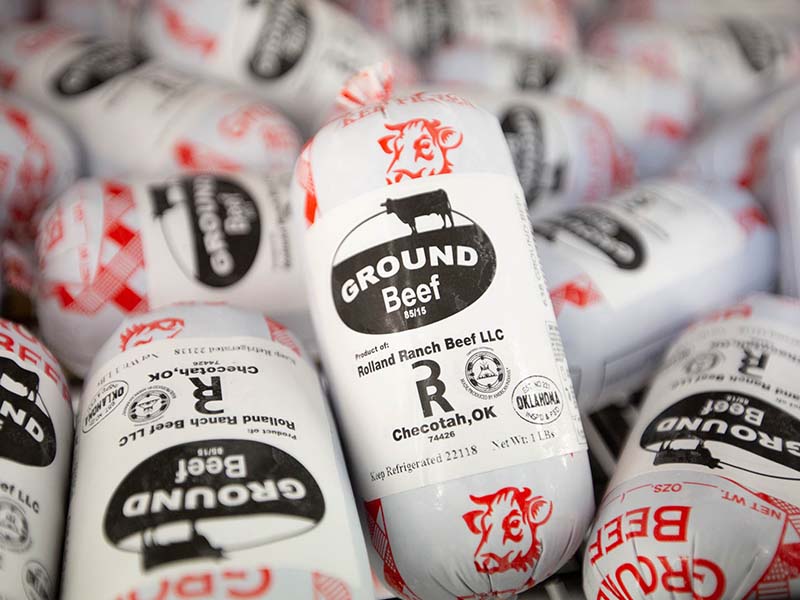
Photo credit: Chickasaw Nation. Beef products from a local tribal producer at a Chickasaw Nation food distribution warehouse. Through the demonstration project, Chickasaw Nation is purchasing a variety of tribally-produced foods for the FDPIR food packages distributed to their tribal members. These products include ground beef, roast beef, dry hominy, stew meat, and pecans.
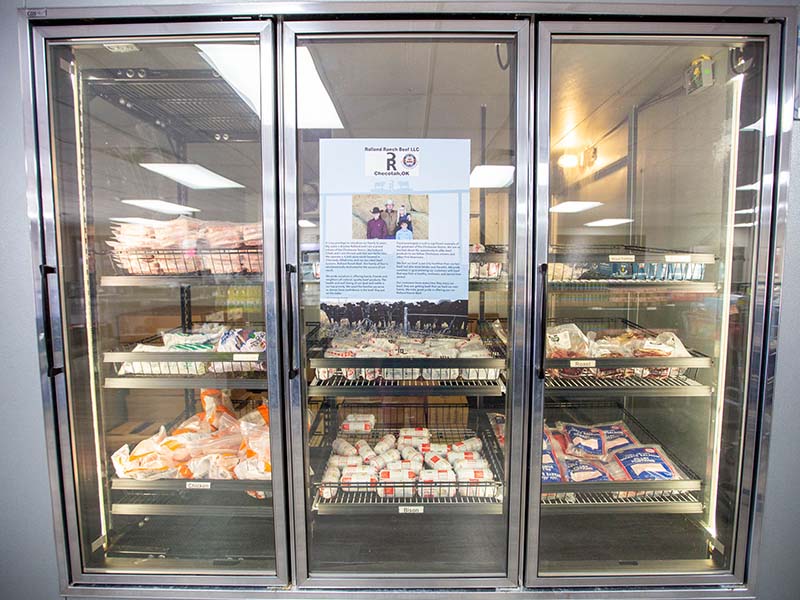
Photo credit: Chickasaw Nation. - Alaska Native Tribal Health Consortium (ANTHC)
Tribally Procured Foods Alaskan halibut, cod, Alaska grown potato USDA Supplanted Foods catfish, walleye, russet potato Vendors Kodiak Island WildSource and Knik Tribe Distribution Months 14 - 28 months Project Contact Dana Diehl
ANTHC Director, Wellness and Prevention
info.fdpir@anthc.org
(907) 729-2440The Alaska Native Health Consortium, known as ANTHC, operates a FDPIR self-determination demonstration project that provides foods to 18 tribes across Alaska. Learn more about the ANTHC project in this video.
Healthy potato plants growing at the Knik Tribe farm near Palmer, Alaska. Beginning in fall/winter 2022, the Alaska Native Tribal Health Consortium will purchase potatoes from the farm with FDPIR self-determination contract funds.
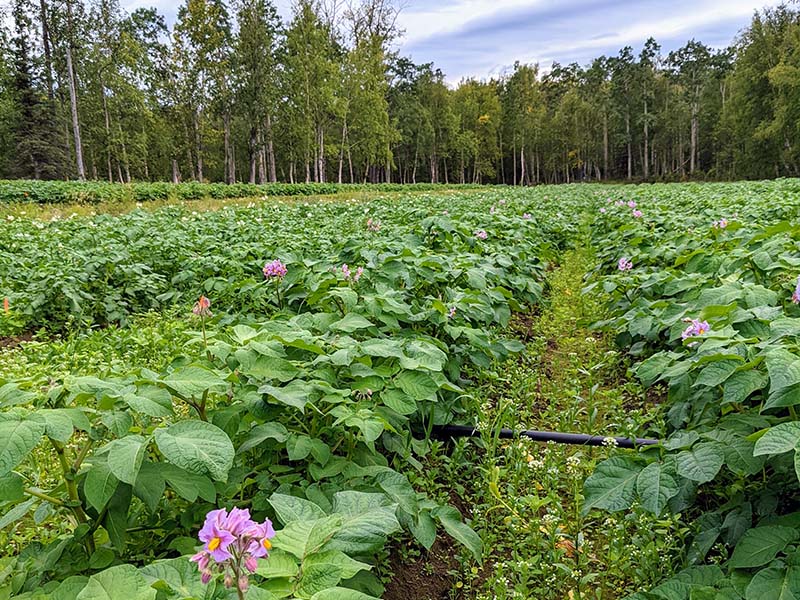
Gregory Nothstine (center), FDPIR Program Director for the Alaska Native Tribal Health Consortium (ANTHC), and Mike Reusser (left) and Jim Baldwin (right) of the Food Bank of Alaska (FBA), receive a first shipment of Alaskan halibut at the FBA warehouse in Anchorage, Alaska. ANTHC purchases the fish with self-determination contract funds and then works with FBA to ship the product (along with other FDPIR foods) to 21 tribal villages throughout the state.

Photo credit: Food Bank of Alaska. Barbara Lopez (FNS Senior Technical Advisor for Supplemental Nutrition and Safety Programs), Gregory Nothstine (FDPIR Program Director for the Alaska Native Tribal Health Consortium (ANTHC)), and Dana Diehl (Director of the Wellness and Prevention Department at ANTHC), in front of the Kodiak Harbor in Kodiak, Alaska. Fresh Alaskan cod and halibut for the demonstration project are fished out of the harbor and processed by Kodiak Island Wildsource, a business owned and operated by the Sun'aq Tribe of Kodiak, before being shipped to FDPIR participants across Alaska.

- Lummi Nation
Tribally Procured Foods salmon, halibut, prawns/shrimp, crab USDA Supplanted Foods catfish, walleye Vendors Nexwelhqeyem Seafood, LLC and Finkbonner Shellfish Distribution Months six months or more Lummi Nation Commodity Foods staff proudly display frozen sockeye salmon fillets purchased with FDPIR self-determination contract funds. Lummi Nation manages several treaty-reserved fisheries off the Washington coast and will be providing a variety of local seafood items to FDPIR participants through the demonstration project.
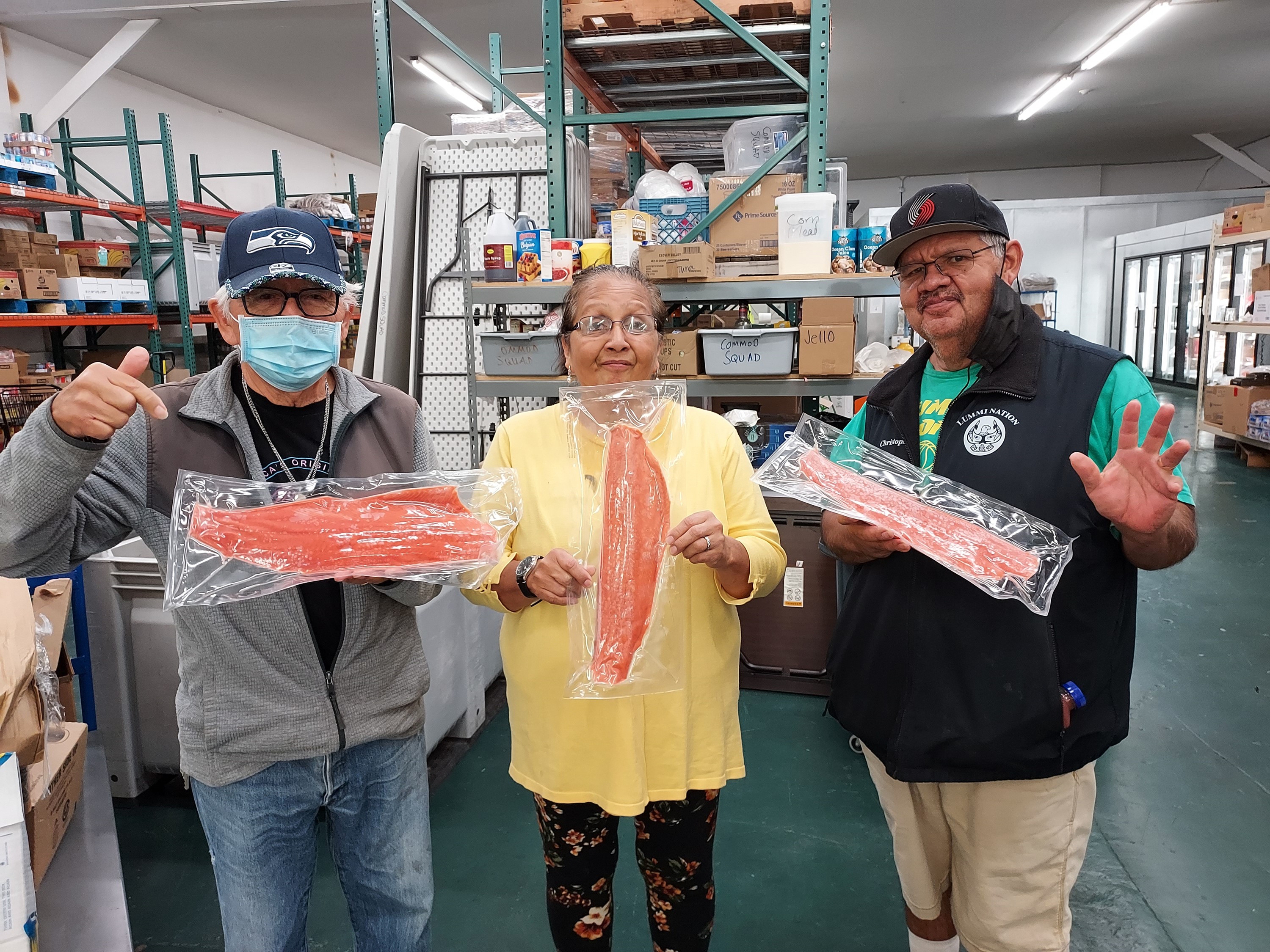
Photo credit: Lummi Nation Commodity Foods. Check out the project photo gallery!
- Mississippi Band of Choctaw Indians (MBCI)
Tribally Procured Foods turnip greens, collard greens, yellow squash, red/green tomatoes, tomato berries, bell peppers, hot/sweet peppers, cucumbers USDA Supplanted Foods romaine lettuce, summer squash, tomatoes, cherry tomatoes, green pepper, cucumbers Vendors Choctaw Fresh Produce Distribution Months 36 months An employee of Choctaw Fresh shows off some fresh collard greens that will be put into FDPIR food packages for eligible tribal members. The Mississippi Band of Choctaw Indians is purchasing a variety of fresh vegetables from the Choctaw Fresh Farm, an organic produce farm located on the Mississippi Band of Choctaw Indians Reservation.
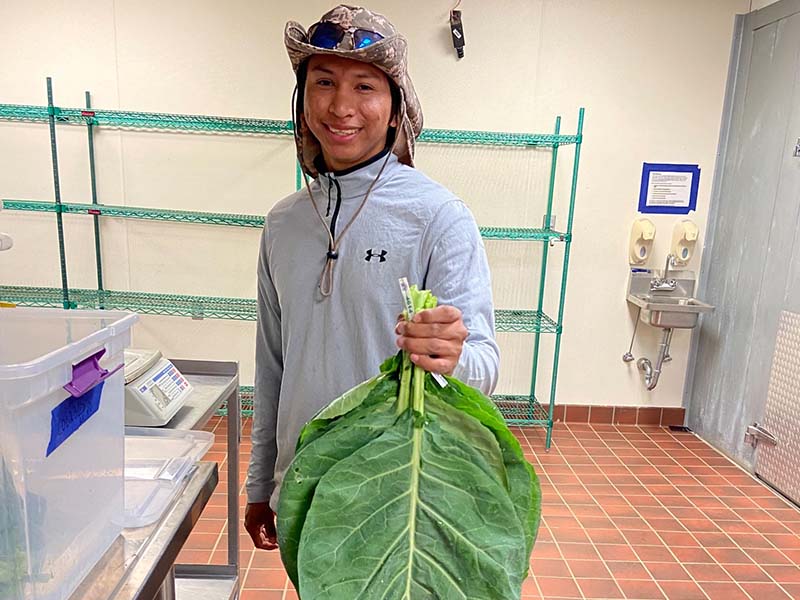
Photo Credit: Choctaw Fresh Farm. Collard green seedlings waiting to be planted in a high tunnel. The Mississippi Band of Choctaw Indians is purchasing turnip greens, collard greens, yellow squash, tomatoes, tomato berries, bell peppers, cucumbers, and a variety of hot and sweet peppers, for FDPIR participants through the FDPIR self-determination demonstration project.
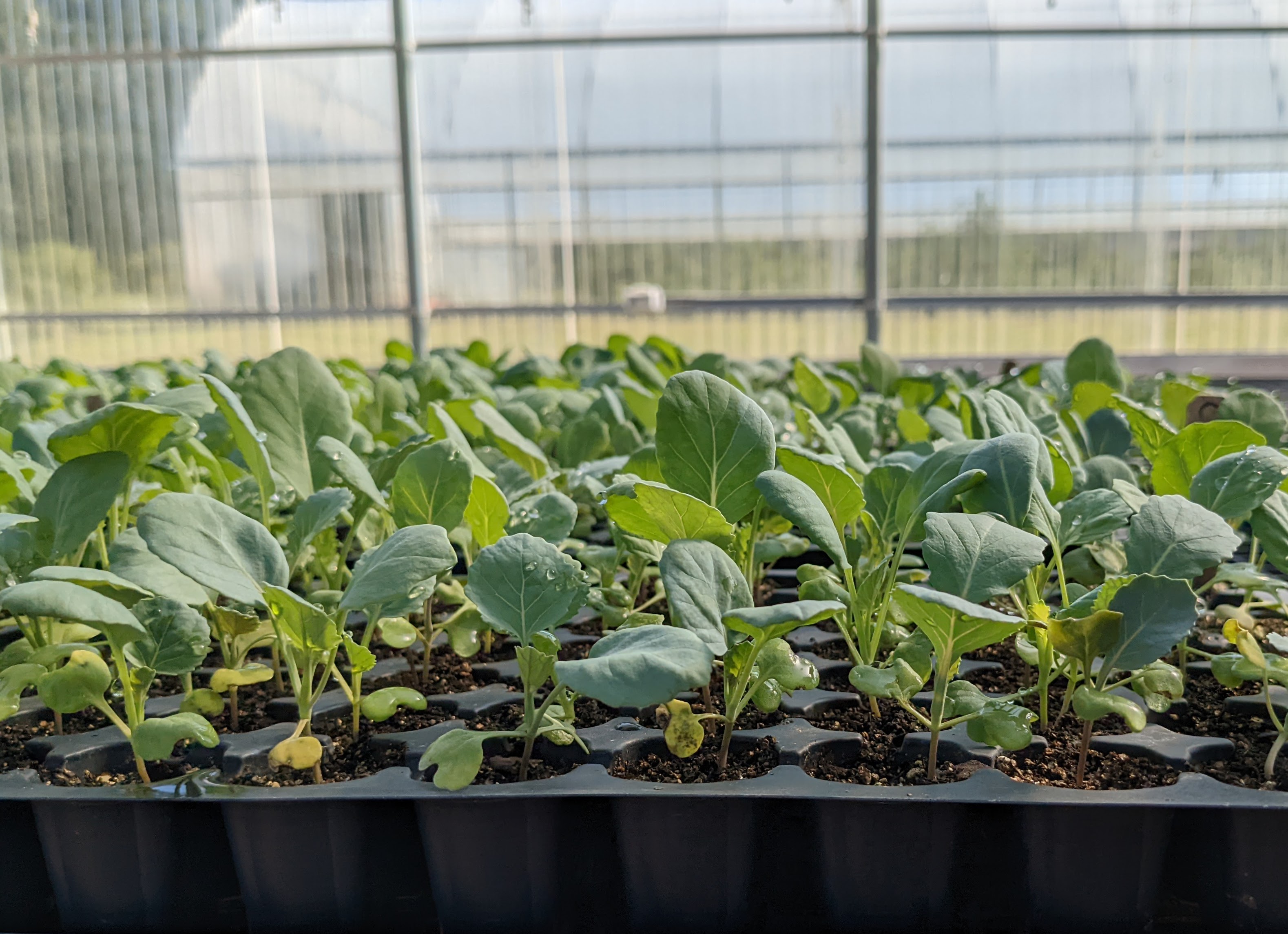
Photo credit: Choctaw Fresh Farm.

